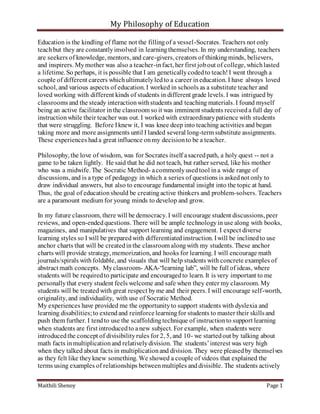
philosophy of educ
- 1. My Philosophy of Education Maithili Shenoy Page 1 Education is the kindling of flame not the fillingof a vessel-Socrates. Teachers not only teachbut they are constantlyinvolved in learningthemselves. In my understanding, teachers are seekers of knowledge, mentors, and care-givers, creators of thinkingminds, believers, and inspirers. Mymother was also a teacher-infact, her first jobout of college, whichlasted a lifetime. So perhaps, it is possible that I am geneticallycodedto teach!I went through a couple of different careers whichultimatelyledto a career ineducation. I have always loved school, and various aspects of education. I worked in schools as a substitute teacher and loved working with different kinds of students in different grade levels. I was intrigued by classroomsand the steady interactionwithstudents and teaching materials. I found myself being an active facilitator inthe classroom so it was imminent students receiveda full day of instructionwhile their teacher was out. I worked with extraordinarypatience with students that were struggling. Before Iknew it, I was knee deep into teaching activities and began taking more and more assignments until I landed several long-term substitute assignments. These experiences hada great influence onmy decisionto be a teacher. Philosophy, the love of wisdom, was for Socrates itself asacredpath, a holy quest -- not a game to be taken lightly. He said that he did not teach, but rather served, like his mother who was a midwife. The Socratic Method- acommonlyusedtool ina wide range of discussions, and is a type of pedagogy in which a series of questions is askednot only to draw individual answers, but also to encourage fundamental insight into the topic at hand. Thus, the goal of educationshould be creatingactive thinkers and problem-solvers. Teachers are a paramount medium for young minds to develop and grow. In my future classroom, there will be democracy. I will encourage student discussions, peer reviews, and open-endedquestions. There will be ample technologyin use along with books, magazines, and manipulatives that support learning and engagement. I expect diverse learning styles so I will be preparedwith differentiatedinstruction. Iwill be inclinedto use anchor charts that will be createdinthe classroom alongwith my students. These anchor charts will provide strategy, memorization, and hooks for learning. I will encourage math journals/spirals withfoldable, and visuals that will help students with concrete examples of abstract math concepts. Myclassroom- AKA-“learning lab”, will be full of ideas, where students will be requiredto participate and encouragedto learn. It is very important to me personallythat every student feels welcome and safe when they enter my classroom. My students will be treated with great respect byme and their peers. I will encourage self-worth, originality, and individuality, with use of Socratic Method. My experiences have provided me the opportunityto support students with dyslexia and learning disabilities;to extendand reinforcelearningfor students to master their skillsand push them further. I tendto use the scaffoldingtechnique of instructionto support learning when students are first introducedto anew subject. For example, when students were introducedthe concept of divisibilityrules for 2, 5, and 10- we startedout by talking about math facts inmultiplicationand relativelydivision. The students’interest was very high when they talked about facts in multiplicationand division. They were pleasedby themselves as they felt like theyknew something. We showed a couple of videos that explained the terms using examples of relationships betweenmultiples anddivisible. The students actively
- 2. My Philosophy of Education Maithili Shenoy Page 2 participatedduring the video as encouragedby the teacher. Next, as a class the teacher sat together with the students to make an anchor chart for divisibilityrules. This was followed by a worksheet that involved use of color by codes usingdivisibilityby 2, 5, and 10. The students split into small groups as teachers encourageduse of anchor chart to help them. I remember myexperiences withmath as I was growing up. It always helpedwhen I was able to make connections whensome topic was complicated. Oftentimes, practicing problems until I was comfortable withit was necessary. As an effective teacher, Iwill engage students in over-learningof basic (or complex) concepts until it comes to them naturally. I genuinely care about educationand as I continue onthis journey into pedagogy, I pray that I get to know eachand every student that crosses paths with me. I hope to see success (even if they are small improvements) and belief-in-self amongmy students. I will make it very clear to students that rules inschool are fairlysimilar to rules inreal life. Therefore, success in school is directlyrelatedto success inlife. Iwill talk about careers and professions more oftenthan not so as to gear their thinking toward future. My students will dare to dream. I believe that knowledge is power and I hope to always stay updated and stream-linedwith new materials. As a future professional, Iintend to provide my students with world-class educationto the best of my abilities everysingle day.